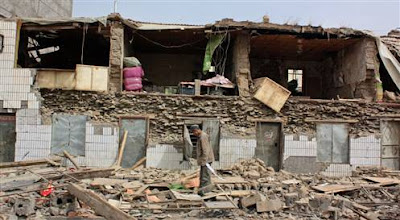A man stands in the rubble near a destroyed building
after an earthquake hit the Tibetan area of China.
after an earthquake hit the Tibetan area of China.
XINING, China - Soldiers and civilians used shovels and their bare hands to dig through collapsed buildings in search of survivors after strong earthquakes struck a mountainous Tibetan region of China on Wednesday, killing at least 589 people and injuring more than 10,000.
The series of quakes flattened buildings across remote western Yushu county and sent survivors, many bleeding from their wounds, flooding into the streets of Jiegu township. State television showed block after devastated block of toppled mud and wood homes. Local officials said 85 percent of the structures had been destroyed.
Residents and troops garrisoned in the town used shovels and their hands to pull survivors and bodies from the rubble much of the day. Several schools collapsed, with the state news agency saying at least 56 students died. Worst hit was the Yushu Vocational School, where Xinhua cited a local education official as saying 22 students died.
Footage on Qinghai Satellite TV showed bodies wrapped in blankets lying on the ground while rescuers pulled shards of concrete from a pancaked school building.
Rescue efforts hampered
Crews set up emergency generators to restore operations at Yushu's airport, and by late afternoon the first of six flights landed carrying rescue workers and equipment.
But the road to town was blocked by a landslide, hampering the rescue as temperatures dropped below freezing. Tens of thousands of the town's 70,000 people were without shelter, state media said.
The airport in Xining, the nearest big city some 530 miles away, was filled with Chinese troops in camouflage, firefighters and dozens of rescue workers with sniffer dogs. The airport had been closed to civilian flights for several hours Wednesday night to make way for the rescue effort.
"The situation here is difficult. Most of the buildings have collapsed. A lot of people are seriously injured," said Pu Wu, a director of the Jinba Project, which provides health care training for Tibetan communities. "We are scared. We are all camping outside and waiting for more tents to come."
Two major TV channels in Qinghai were ordered to stop airing entertainment programs including TV series and broadcast earthquake news non-stop, NBC's Bo Gu reported.
While China's military is well-practiced in responding to disasters, the remote location posed logistical difficulties. The area sits at around 13,780 feet on the Tibetan Plateau, NBC's Gu reported.
Most people live in Jiegu, with the remaining — mostly herders — scattered across the broad valleys. The small airport has no refueling supplies, so relief flights were carrying extra jet fuel, reducing their capacity for hauling supplies, state media reported.
Cracked dam
The local quake relief headquarters put the death toll at 589 and the injured at 10,000 by early Thursday morning, according to the Xinhua news agency. Wu Yong, commander of the army garrison, said the deaths "may rise further as lots of houses collapsed." Hospitals were overwhelmed, and rescue teams were slowed by damaged roads, strong winds and frequent aftershocks.
Luo Song, a monk from a monastery in Yushu county, said his sister who worked at an orphanage told him three children were sent to a hospital but the facilities lacked equipment.
"She said the hospitals are facing a lot of difficulty right now because there are no doctors, they have only bandages, they can't give injections, they can't put people on intravenous drips," the monk said by phone while on a visit to the southern Chinese city of Shenzhen. China's rural hospitals typically are not well equipped.
Workers released water from a nearby reservoir whose dam was cracked by the quake, according to the China Earthquake Administration.
President Hu Jintao and Premier Wen Jiabao urged "all-out efforts" to rescue survivors and dispatched a vice-premier to supervise the effort. The government immediately allocated $30 million for relief, and mobilized more than 5,000 soldiers, medical workers and other rescuers, joining 700 troops already on the ground.
With many people forced outside, the provincial government said it was rushing 5,000 tents and 100,000 coats and blankets to the region, where average daily temperatures were around 43 degrees.

Great about you latest news.......
ReplyDeleteOnline Telugu News